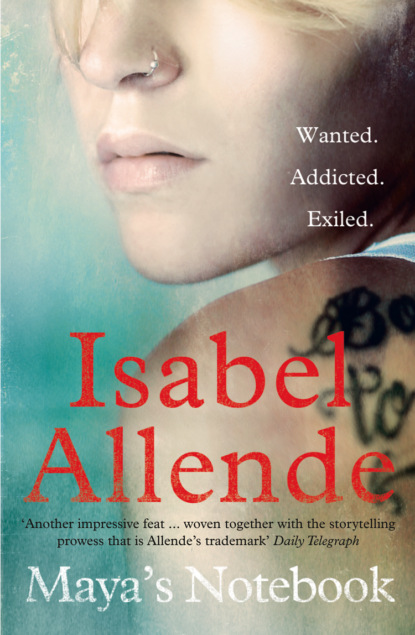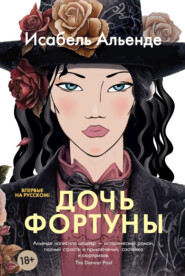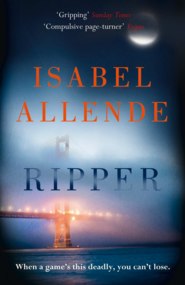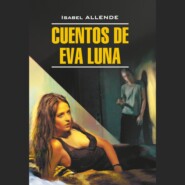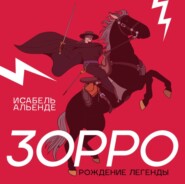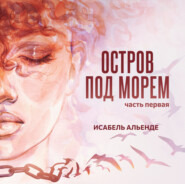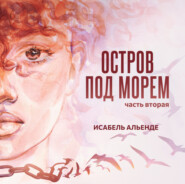По всем вопросам обращайтесь на: info@litportal.ru
(©) 2003-2024.
✖
Maya’s Notebook
Автор
Год написания книги
2018
Настройки чтения
Размер шрифта
Высота строк
Поля
“It’s a possibility, but it hasn’t been proven.”
“The existence of your planet hasn’t been proven either, and you sure believe in that,” I countered, and he laughed with satisfaction.
“You’re right, Maya. It’s absurd only to believe in what can be proven.”
“Remember when you took me to the observatory to see a comet, Popo? That night I saw God. There was no moon, the sky was black and full of diamonds, and when I looked through the telescope I clearly distinguished the comet’s tail.”
“Dry ice, ammonia, methane, iron, magnesium, and—”
“It was a bridal veil and behind it was God,” I assured him.
“What did he look like?” he asked me.
“Like a luminous spiderweb, Popo. The threads of that web connect everything that exists. I can’t explain it to you. When you die, you’re going to travel like that comet, and I’ll be right behind, attached to your tail.”
“We’ll be astral dust.”
“Ay, Popo!”
“Don’t cry, little one, because you’ll make me cry too, and then your Nini will start to cry and we’ll never be able to console each other.”
In his last days he could only swallow little spoonfuls of yogurt and sips of water. He barely spoke, but he didn’t complain either; he spent the hours floating in a half-sleep of morphine, clinging to his wife’s hand or to mine. I doubt he knew where he was, but he knew we loved him. My Nini kept telling him stories until the end, when he couldn’t understand them anymore, but the cadence of her voice soothed him. She told him about two lovers who were reincarnated in different times, had adventures, died, and met each other again in other lives, always together.
I murmured prayers I’d invented myself in the kitchen, in the bathtub, in the tower, in the garden, anywhere I could hide away, and I begged Mike O’Kelly’s God to take pity on us, but he remained remote and silent. I got covered in rashes, my hair fell out in clumps, and I bit my nails till my fingers bled; my Nini wrapped my fingertips with adhesive tape and forced me to wear gloves to bed. I couldn’t imagine life without my grandpa, but I couldn’t stand his slow agony either and ended up praying he would die soon and stop suffering. If he had asked me to, I would have given him more morphine to help him die. It would have been very easy, but he never asked.
I slept fully dressed on the living room sofa, with one eye open, watching, and so I knew before anyone else when our time had come to say good-bye. I ran to wake up my Nini, who’d taken a sleeping pill to try to get a bit of rest, and I phoned my dad and Susan, who were there ten minutes later.
My grandmother, in her nightie, climbed into her husband’s bed and laid her head on his chest, the way they’d always slept. Standing on the other side of my Popo’s bed, I leaned against his chest too, which used to be strong and wide and big enough for both of us, but now was barely moving. My Popo’s breathing had become imperceptible, and for a few very long instants it seemed to have stopped completely, but he suddenly opened his eyes, swept his gaze over my dad and Susan, who stood near the bed crying silently, lifted his big hand with effort, and laid it on my head. “When I find the planet, I’ll name it after you, Maya,” was the last thing he said.
In the three years that have passed since the death of my grandfather, I’ve very rarely talked about him. This caused me quite a few problems with the psychologists in Oregon, who tried to force me to “resolve my grief” or some similar trite platitude. There are people like that, people who think all grief is the same and that there are formulas and stages to overcoming it. My Nini’s stoic philosophy is more suitable: “Since we’re going to suffer, let’s clench our teeth,” she said. Pain like that, pain of the soul, does not go away with remedies, therapy, or vacations; you simply endure it deep down, fully, as you should. I would have done well to follow my Nini’s example, instead of denying that I was suffering and stifling the howl that was stuck in my chest. Later, in Oregon, they prescribed antidepressants, which I didn’t take, because they made me stupid. They watched me, but I was able to trick them by hiding chewing gum in my mouth, where I stuck the pill with my tongue and minutes later spit it out intact. My sadness kept me company; I didn’t want to be cured of it as if it were a cold. I didn’t want to share my memories with those well-intentioned therapists either, because anything I might tell them about my grandfather would sound banal. However, on this island in Chiloé, not a day goes by when I don’t tell Manuel Arias some anecdote about my Popo. My Popo and this man are very different, but they both have a certain giant-tree quality about them, and I feel protected by them.
I just had a rare moment of communion with Manuel, like the kind I used to have with my Popo. I found him watching the sunset from the big front window, and I asked him what he was doing.
“Breathing.”
“I’m breathing too. That’s not what I was referring to.”
“Until you interrupted me, Maya, I was breathing, nothing more. You should see how difficult it is to breathe without thinking.”
“That’s called meditation. My Nini meditates all the time, says she can feel my Popo at her side that way.”
“And do you feel him?”
“I didn’t used to, because I was frozen inside and I didn’t feel anything. But now it seems like my Popo is around here somewhere, orbiting around. …”
“What’s changed?”
“Everything, Manuel. For a start, I’m sober, and besides it’s calm here, there’s silence and space. It would do me good to meditate, like my Nini, but I can’t, I’m always thinking, my head’s always full of ideas. Do you think that’s bad?”
“Depends on the ideas. …”
“I’m no Avicenna, as my grandma likes to point out, but good ideas do occur to me.”
“Like what?”
“At this exact moment I can’t think of any, but as soon as I get a brilliant one, I’ll tell you. You think about your book too much, but you don’t spend time thinking about more important things, for example, how depressing your life was before my arrival. And what will become of you when I go? You should think about love, Manuel. Everybody needs love.”
“Aha. Where’s yours?” he asked, laughing.
“I can wait—I’m nineteen years old with my whole life ahead of me; you’re ninety, and you could die in five minutes.”
“I’m only seventy-two, but it’s true that I could die five minutes from now. That’s a good reason to avoid love; it would be impolite to leave a poor woman widowed.”
“With thinking like that, your goose is cooked, man.”
“Sit down here with me, Maya. An old man on his last legs and a pretty girl are going to breathe together. As long as you can shut up for a while, that is.”
That’s what we did as night fell. And my Popo was with us.
When my grandpa died, I was left without a compass and without family: my father lived in the air, Susan was sent to Iraq with Alvy to sniff out bombs, and my Nini sat down to mourn her husband. We didn’t even have any dogs. Susan used to bring pregnant dogs home. They stayed until the puppies were three or four months old, and then she took them away to train them; it was hard not to get attached to them. Puppies would have been a great solace when my family dispersed. Without Alvy or any puppies, I didn’t have anyone to share my sorrow.
My father was involved in other love affairs, leaving an impressive trail of clues, as if desperate for Susan to find out. At forty-one years of age he was trying to look thirty, paid a fortune for his haircut and his sports clothes, lifted weights, and went to a tanning parlor. He was better looking than ever, his graying temples giving him a distinguished air. Susan, on the other hand, tired of a life spent waiting for a husband who never entirely landed, who was always ready to take off or whispering into his cell phone with other women, had succumbed to the wear and tear of age, gained weight, dressed like a man, and wore ugly glasses she bought by the dozen at the pharmacy. She jumped at the chance to go to Iraq as an escape from that humiliating relationship. The separation was a relief to them both.
My grandparents had been truly in love. The passion that began in 1976 between that exiled Chilean woman, who kept her suitcase packed, and the American astronomer passing through Toronto stayed fresh for three decades. When my Popo died, my Nini was left inconsolable and confused, no longer herself. She was also left without means, because in a few months the illness had consumed their savings. She received her husband’s pension, but it wasn’t enough to maintain the galleon cast adrift that was her house. Without giving me even two days’ warning, she rented the house to a businessman from India, who filled it with relatives and merchandise, and went to live in a room above my dad’s garage. She got rid of most of her belongings, except for the love letters her husband had left her here and there over their years together, my drawings, poems, and diplomas, and her photographs, irrefutable proof of the happiness she’d shared with Paul Ditson II. Leaving that big house, where she’d been so fully loved, was a second mourning. For me it was a coup de grâce. I felt I’d lost everything.
My Nini was so isolated in her mourning that although we lived under the same roof, she didn’t see me. A year earlier she’d been a youthful, energetic, cheerful, and intrusive woman, with unruly hair, Birkenstocks, and long skirts, always busy, helping, inventing; now she was a middle-aged widow with a broken heart. Hugging the urn of her husband’s ashes, she told me the heart breaks like a glass, sometimes with a silent crack and other times smashing to pieces. She didn’t notice as she gradually eliminated the colors from her wardrobe and ended up wearing only black, stopped dyeing her hair, and added ten years to her appearance. She distanced herself from her friends, including Snow White, who couldn’t manage to interest her in any of the protests against the Bush government, in spite of the incentive of getting arrested, which once would have been irresistible to her. She began to dice with death.
My dad did the sums on the sleeping pills his mother was taking and the number of times she crashed her Volkswagen, left the stove on, and suffered spectacular falls, but he didn’t intervene until he discovered her spending the little money she had left on communicating with her husband. He followed her to Oakland and rescued her from a trailer painted with astrological symbols, where a psychic earned her living by connecting people with their deceased—pets as often as relatives. My Nini let him drive her to a psychiatrist, who began to treat her twice a week and stuffed her full of pills. She didn’t “resolve her grief,” and kept crying over my Popo, but she got over the paralyzing depression she’d sunk into.
Gradually, my grandma emerged from her cave over the garage and peeked out at the world, surprised to see that it hadn’t stopped spinning. In a short time the name Paul Ditson II had been erased; not even their granddaughter talked about him anymore. I had withdrawn inside a hard shell and wouldn’t let anyone get close to me. I turned myself into a defiant and sulky stranger, who didn’t answer when spoken to, burst into the place like a whirlwind, didn’t lift a finger to help around the house, and slammed doors at the slightest annoyance. The psychiatrist explained to my Nini that I was suffering from a combination of adolescence and depression and recommended that she sign me up for youth bereavement groups, but I wouldn’t hear of it. In the darkest nights, when I was most desperate, I sensed my Popo’s presence. My sadness summoned him.
My Nini had slept for thirty years with her husband’s chest as a pillow, soothed by the steady sound of his breathing. She had lived in comfort, protected by the warmth of this kind man who celebrated her extravagances of horoscopes and hippie aesthetics, her political extremism, and her foreign cooking, who put up with her mood swings, her sentimental raptures, and her sudden premonitions, which tended to alter the family’s best plans, all with good humor. When she was most in need of someone to console her, her son was rarely nearby, and her granddaughter had turned into a lunatic brat.
That’s when Mike O’Kelly reappeared, having undergone another operation on his back and spent several weeks in a physical rehabilitation center. “You didn’t come to visit me once, Nidia, and you didn’t even call,” he said instead of hello. He’d lost twenty-five pounds, grown a beard, and I almost didn’t recognize him. He looked older, no longer as if he could be my Nini’s son. “What can I do to get you to forgive me, Mike?” she begged him, leaning over his wheelchair. “Make some cookies for my boys,” he replied. My Nini had to bake them on her own, because I declared myself sick of Snow White’s repentant delinquents and other noble causes I didn’t give a shit about. My Nini raised her hand to give me a slap, which I deserved, besides, but I grabbed her wrist in midair. “Don’t you dare ever hit me again, or it’ll be the last you see of me, get it?” She got it.
That was just the shake-up my grandma needed to stand up and get moving again. She went back to her job at the library, though she was no longer able to invent anything and only repeated the stories from before. She went for long walks in the woods and began to attend the Zen Center. She is completely lacking in talent for serenity, but in the forced quietude of meditation she’d invoke my Popo and he would come, like a gentle presence, to sit beside her. I went with her just once to the Sunday ceremony at the Zendo, where I grumpily sat through a talk about the monks who swept the monastery, the significance of which entirely eluded me. Seeing my Nini in the lotus position among Buddhists with shaved heads and pumpkin-colored robes, I could imagine just how lonely she was, but my compassion lasted barely an instant. A short while later, as we shared green tea and organic rolls with the rest of the people there, I’d gone back to hating her, just as I hated the whole world.
No one saw me cry after we cremated my Popo and they handed us his ashes in a clay urn; I didn’t mention his name again, and I didn’t tell anyone that he appeared to me.
I was going to Berkeley High, the only public secondary school in the city and one of the best in the country, though too big, with 3,400 students: 30 percent white, another 30 percent black, and the rest Latinos, Asians, and mixed race. When my Popo went to Berkeley High, it was a zoo—the principals would barely last a year and then quit, exhausted—but by the time I was there the teaching was excellent; although the level of the students was very uneven, there was order and cleanliness, except in the washrooms, which by the end of the day were disgusting, and the principal had been in his post for five years. They said the principal was from another planet, because nothing got through his thick hide. We had art, music, theater, sports, science labs, languages, comparative religion, politics, social programs, workshops for lots of classes, and the best sex education, which was given to everyone, including the fundamentalist Muslims and Christians, who didn’t always appreciate it. My Nini published a letter in the Berkeley Daily Planet proposing that the LGBTU group (lesbians, gays, bisexuals, transsexuals, and undecided) should add an H to their name to include hermaphrodites. That was one of those initiatives, typical of my grandmother, that made me nervous, because they’d take wing and we’d end up protesting in the street with Mike O’Kelly. They always figured out a way to drag me into it.
Students who applied themselves flourished at Berkeley High and then went directly to the most prestigious universities, like my Popo did, with a scholarship to Harvard for his good grades and his baseball skills. Mediocre students floated along trying not to be noticed, and the weak ones got left behind or went into special programs. The most troubled, the drug addicts and gang members, ended up on the streets, expelled or dropouts. For the first two years I’d been a good student and participated in sports, but in a matter of three months I descended into the last category; my marks went down the drain, I got into fights, shoplifted, smoked marijuana, and fell asleep in class. Mr. Harper, my history teacher, was concerned and spoke to my father, who couldn’t do anything except give me a sermon, and sent me to the school health center, where they asked me a few questions and, once they’d established that I wasn’t anorexic and hadn’t tried to commit suicide, left me alone.
Berkeley High is an open campus, lodged in the middle of the city, where it was easy for me to get lost in the crowd. I started skipping classes systematically, going out for lunch and not coming back in the afternoon. We had a cafeteria where only nerds went; it wasn’t cool to be seen there. My Nini was an enemy of the local hamburger and pizza joints and insisted I go to the cafeteria, where the food was organic, tasty, and cheap, but I never listened to her. We students would hang out in the Park, a nearby square, one block from police headquarters, where the law of the jungle prevailed. Parents protested about the drug culture of kids hanging out in the Park, the press published articles, the police walked through and looked the other way, and the teachers washed their hands of it, because it was outside their jurisdiction.
In the Park we divided up into groups, separated by social class and color. The potheads and skateboarders had their sector, whites stayed in another, the Latino gang kept to the edges, defending their imaginary territory with ritual threats, and in the center the drug dealers set themselves up. In one corner were the exchange students from Yemen, who’d been in the news because they were attacked by a bunch of African American guys armed with baseball bats and penknives. In another corner was Stuart Peel, always alone, because he dared a twelve-year-old girl to run across the highway and she got run over by two or three cars; she didn’t die, but she was disabled and disfigured and the one who played the joke on her paid for it with ostracism: nobody ever spoke to him again. Mixed in with the students were the “sewer punks,” with their green hair and piercings and tattoos, the homeless with their full shopping carts and obese dogs, several alcoholics, a crazy lady who used to moon people, and other regulars.
Some kids smoked, drank alcohol out of Coke bottles, made bets, and passed around joints and pills under the cops’ noses, but the vast majority just ate their lunch and then went back to school when the forty-five-minute break was over. I wasn’t one of those. I attended just enough so I’d know what they were talking about in class.





